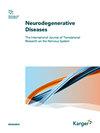不良饮食、压力和缺乏运动汇聚成一场“完美风暴”,驱动阿尔茨海默病的发病机制
IF 1.9
4区 医学
Q3 CLINICAL NEUROLOGY
引用次数: 18
摘要
北美阿尔茨海默病(AD)的发病率预计将在未来一代增加一倍以上。虽然已知围绕淀粉样蛋白-β和磷酸化tau蛋白的产生和清除的遗传因素是导致一部分早发性AD病例的原因,但它们并不能解释更普遍的散发性晚发性AD的发病机制。因此,生活方式和环境因素可能与AD发病机制中涉及的神经退行性过程有关。在此,我们回顾了以下证据:(1)过量的蔗糖消耗诱导ad相关的肝脏病变和脑胰岛素抵抗;(2)慢性应激过度驱动蓝斑神经元的活动,导致功能丧失(神经退行性变的常见事件);(3)高糖饮食和应激促进男性和女性神经保护性性激素的丧失;(4)西方饮食趋势为锂缺乏状态奠定了基础。我们认为这些因素可能作为“完美风暴”的一部分相互交叉,从而导致神经退行性疾病和AD的广泛流行。此外,我们提出的论点是,运动和补充微量锂可以抵消许多与过量热量摄入和持续压力相关的有害后果。我们的结论是,生活方式和环境因素可能导致阿尔茨海默病的发病,简单的生活方式和饮食改变可以帮助抵消它们的影响。本文章由计算机程序翻译,如有差异,请以英文原文为准。
Poor Diet, Stress, and Inactivity Converge to Form a “Perfect Storm” That Drives Alzheimer’s Disease Pathogenesis
North American incidence of Alzheimer’s disease (AD) is expected to more than double over the coming generation. Although genetic factors surrounding the production and clearance of amyloid-β and phosphorylated tau proteins are known to be responsible for a subset of early-onset AD cases, they do not explain the pathogenesis of the far more prevalent sporadic late-onset variant of the disease. It is thus likely that lifestyle and environmental factors contribute to neurodegenerative processes implicated in the pathogenesis of AD. Herein, we review evidence that (1) excess sucrose consumption induces AD-associated liver pathologies and brain insulin resistance, (2) chronic stress overdrives activity of locus coeruleus neurons, leading to loss of function (a common event in neurodegeneration), (3) high-sugar diets and stress promote the loss of neuroprotective sex hormones in men and women, and (4) Western dietary trends set the stage for a lithium-deficient state. We propose that these factors may intersect as part of a “perfect storm” to contribute to the widespread prevalence of neurodegeneration and AD. In addition, we put forth the argument that exercise and supplementation with trace lithium can counteract many of the deleterious consequences associated with excessive caloric intake and perpetual stress. We conclude that lifestyle and environmental factors likely contribute to AD pathogenesis and that simple lifestyle and dietary changes can help counteract their effects.
求助全文
通过发布文献求助,成功后即可免费获取论文全文。
去求助
来源期刊

Neurodegenerative Diseases
医学-临床神经学
CiteScore
5.90
自引率
0.00%
发文量
14
审稿时长
6-12 weeks
期刊介绍:
''Neurodegenerative Diseases'' is a bimonthly, multidisciplinary journal for the publication of advances in the understanding of neurodegenerative diseases, including Alzheimer''s disease, Parkinson''s disease, amyotrophic lateral sclerosis, Huntington''s disease and related neurological and psychiatric disorders.
 求助内容:
求助内容: 应助结果提醒方式:
应助结果提醒方式:


